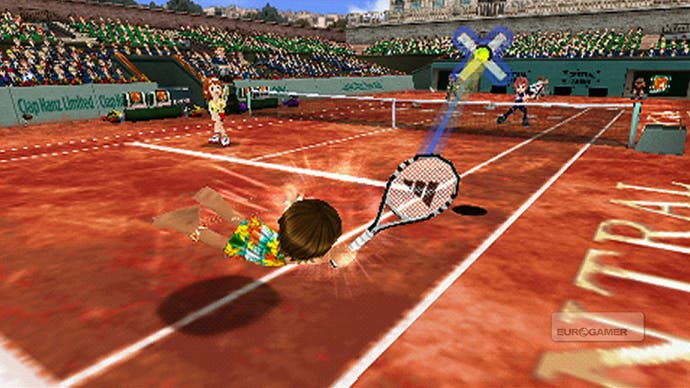Everybody's Tennis
Love all.
Everything is overtly gamified and quantified. The number of performance bonuses in play far surpasses anything seen in a tennis game before. And yet, thanks to the cute aesthetic and clean, logical presentation of the data, it's never overwhelming.
Every winning shot you play earns shot points for how impressive it was, whether it was an ace or ace return, or whether it drew a long rally to a close. Conversely you lose points for failing to return a ball, and there are larger bonuses on offer for taking a game without your opponent winning a point. At the end of each match you receive score out of a hundred for how decisively you beat an opponent in the match, and the fewer the points they won, the higher the reward.
All of these different rewards feed into the same economy, and are aggregated and multiplied by your character's current tier level and then added to your bank, which can be used to purchase new items of clothing and equipment. The system is both strong and addictive as the steady flow of meaningful rewards on a minute by minute basis lodges the game's hooks into you, helped by the fact that most games are short, snappy affairs, over in less that five minutes.

The story that interweaves with the matches you play is often convoluted but is nevertheless wholly charming. By focusing on young players starting out at a smalltime local tennis club, and escalating through high school and upwards, the narrative has a kind of Karate Kid trajectory, and the rivalries that are set up off the court do inject wider meaning to the matches themselves.
In fact, it's one of the best examples of integration of a story into a sports game yet seen, a marriage usually awkward and bolt-on. By contrast, here you care about the characters and their micro-dramas, and the carefully pitched dialogue can characterisation works wonders for the experience, where it might have been expected to make it cumbersome.
Rather than picking a single character to take from the local club to world-class champion, you have a roster of characters with different strengths and weaknesses. This line-up is added to as you make new friends through the story and, while there are no penalties for chopping and changing between whom you pick for any one game, you fill a loyalty meter with repeated use of the same character that unlocks new shots and bonuses as it fills.

The issue with any sports game that takes an RPG approach is that it can be either boring in the earliest stages or too easy in the latter stages when the full range of abilities is finally open to you. Here Sony's experience with Everybody's Golf shines through, as the tennis is satisfying from first touch, and rather than breaking this core fun as it progresses, the new shots and abilities extend it into new areas along a distinguished development trajectory.
Everybody's Tennis is the ideal handheld approach to the sport, exchanging realism for lightheartedness without compromising the quality of the tennis. The micro-rewards may have an air of Farmville about them, but the unlocks they feed into embellish the core game, rather than simply decorating it. As a result, Everybody's Tennis is aptly named, appealing the everyman despite speaking in the vernacular of the RPG nerd.

